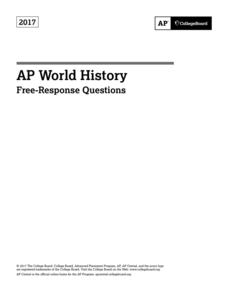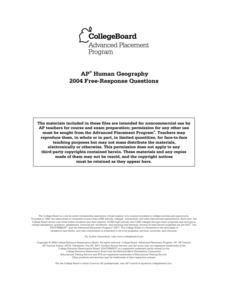College Board
2017 AP® United States History Free-Response Questions
Were unfair taxes really the cause of the American Revolution? Learners explore the complicated historiography behind the revolutionary period using authentic College Board prompts. The free-response questions from the exam feature...
College Board
2017 AP® World History Free-Response Questions
Religion and politics have a complicated history. How were they intertwined with wealth in Europe and Asia in the Middle Ages? Learners explore the question using a prompt based on primary sources. Other activities allow individuals to...
College Board
2001 AP® Psychology Free-Response Questions
What could impact a patient's anxiety, and what should a therapist do to treat it? Learners consider the questions using a prompt from the College Board. A second question asks individuals to consider how key psychological dynamics...
College Board
2004 AP® Psychology Free-Response Questions
Time influences mental health and behavior, but how? Learners explore the topic with authentic College Board materials. Using another scenario, scholars consider the various research methods used to explore the connection between stress...
College Board
2014 AP® Psychology Free-Response Questions
A college undergrad has a lackluster first year. Why? A structured prompt from the College Board asks learners to explore various psychological dynamics and how they can affect a young man's freshman experience. A second question asks...
College Board
1999 AP® Macroeconomics Free-Response Questions
Gross domestic product can be a telling indicator about the health of a country, but it has limitations. Learners examine common indicators using structured prompts and problem sets from the College Board. Other practice problems include...
College Board
2001 AP® Macroeconomics Free-Response Questions
The European Union has had a profound effect on world economic dynamics. A structured inquiry investigates its impacts on global interest rates. Other authentic testing materials from College Board explore banking reserve requirements...
College Board
2002 AP® Macroeconomics Free-Response Questions
Imagine the United States is experiencing an unusually high unemployment rate. What options does the federal government have to kick-start the economy? Learners consider the question with a structured prompt. Other questions examine...
College Board
2009 AP® Human Geography Free-Response Questions
Why have organic farms increased while dairy farms have decreased? Learners unravel this and other questions about geography, religion, and urban living patterns in a set of assessment questions. The resource includes short-answer...
Penguin Books
An Educator’s Guide to Ruta Sepetys
Historical fiction novels give readers a chance to step into someone else's shoes. An educator's guide from Penguin Common Core Lesson Plans provides resources to accompany three historical fiction novels written by Ruta Sepetys: Between...
Penguin Books
An Educators' Guide to Between Shades of Gray by Ruta Sepetys
Books can help teens understand complex global issues. A helpful educator's guide introduces readers to what it's like to be a refugee. Lesson components for the novel Shades of Gray include an anticipation guide and writing and...
College Board
2012 AP® Human Geography Free-Response Questions
Why do countries create boundaries? Scholars explore similar ideas using prompts from the 2012 AP Human Geography test. Pupils also test their acumen with questions on agriculture and the growth of Islam.
College Board
2014 AP® Human Geography Free-Response Questions
How is the sale and marketing of coffee indicative of globalism? Learners clarify complicated dynamics using practice prompts from the College Board Exam. Other practice topics include colonialism in Africa and economic growth...
Judicial Learning Center
Your Day in Court: Criminal Justice
When a person goes on trial for a crime, what options does a court have to render justice? Who are the key players in the legal system? Interested legal scholars answer the inquiries and more using an Internet-based activity, chart, and...
Judicial Learning Center
The Judge and the Jury: Trial by Jury
Why is it so important to have a trial by jury in the American judicial system? This right is one of the hallmarks of American democracy, but it also comes with the responsibility of serving on a jury if called. Young legal scholars...
Judicial Learning Center
Judicial Independence: What’s Wrong with This Court?
Why is it important for judges to operate independently of politics or other branches of government? Scholars ponder the question as they examine video clips, case studies, excerpts of the US Constitution, and an interactive computer...
Judicial Learning Center
Understanding the Types of Cases
Most young scholars are aware of the criminal courts system, but the United States Constitution allows for a much broader role. What other roles do courts play in settling other questions? A case study and WebQuest-style activities...
National Constitution Center
The Development and Application of the First Amendment
What are the limits on freedom of speech? While a cherished right in the Constitution, it is not unbridled. Budding historians consider what checks should exist on this liberty using news stories, court cases, and College Board prompts.
National Constitution Center
Federalism, the Commerce Clause, and the Tenth Amendment
How do the state and federal governments relate to each other? The Constitution has a lot to say about that! Using an interactive online tool, pupils explore the Tenth Amendment. They apply their knowledge to political cartoons and news...
National Constitution Center
Voting Rights since the Fifteenth Amendment
What does it mean to have the right to vote? To what extent have interpretations of the Fifteenth Amendment changed over time? Young historians examine and analyze primary source documents, an interactive website, and historical analysis...
National Constitution Center
Civil Liberties and Rights Worldwide
How do governments differ in how they protect human rights? While the United States prides itself on its Bill of Rights, other countries have their own ways of protecting citizens' liberties. An interactive website, paired with...
College Board
2004 AP® Human Geography Free-Response Questions
Human geography involves everything from why people build factories along the United States-Mexico border to how land-use patterns and demographics are related. So, how do test-takers put it all together? Focused questions from an AP...
College Board
2005 AP® Human Geography Free-Response Questions
Why do people leave their home countries and come to the United States? How has nationalism affected European nations politically and socially? The answers are complicated. Pupils explore the intricate dynamics using structured questions...
College Board
2006 AP® Human Geography Free-Response Questions
People aren't the only things moving—businesses do, too. Scholars examine what causes human migration and its effects as well as what factors go into a business's decision to relocate. They analyze the complex dynamics in human...























